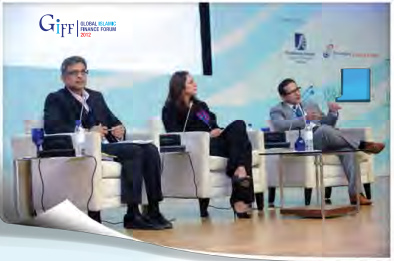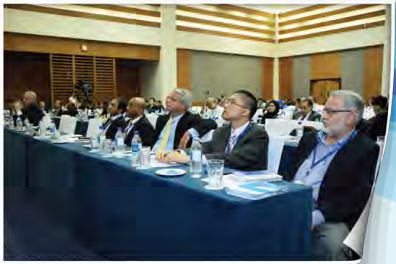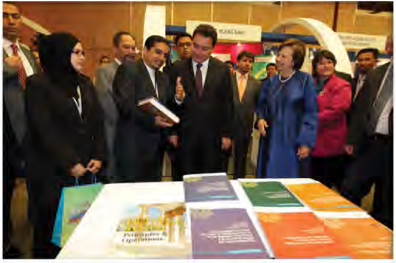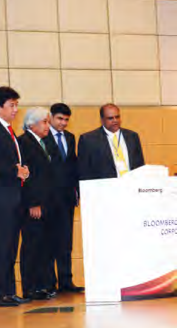
Bank Negara Malaysia (BNM) hosted the third Global Islamic Finance Forum (GIFF) in Kuala Lumpur on September 18-20, 2012. Previous GIFFs were held in 2007 and 2010. Given the decreasing time between the consecutive GIFFs (GIFF 2007 was held in March 2007, followed by GIFF 2010 held in October 2010; GIFF 2012 took place less than two years after), it is expected that this will become an annual gathering of perhaps the most influential leaders in Islamic banking and finance.
GIFF is organized with the support of the Malaysia International Islamic Financial Centre (MIFC), which was launched in 2006 to promote Malaysia as a hub for Islamic finance. Since then, Malaysia has played a very important role in innovation and thought leadership in Islamic finance. This year’s event was supported and co-organised by the Islamic Banking & Finance Institute Malaysia (IBFIM), Securities Commission of Malaysia, Bursa Malaysia, Association of Islamic Banking Institutions Malaysia (ABFIM), Malaysian Takaful Association, International Shariah Research Academy for Islamic Finance (ISRA), and International Centre for Education in Islamic Finance (INCEIF). The event was convened at the BNM’s state-of-the-art building in Sasana Kijang and the old yet very impressive Lanie Kijang.
The theme of GIFF 2012 was “Internationalisation of Islamic Finance: Bridging Economies”. Given the importance of the theme, it attracted more than 1,100 applications for only 800 available places. Participants originated from 59 different countries. There were 155 speakers and including both local and international industry leaders to address topical issues around the current state of the industry and to seek solutions to challenges the Islamic finance industry faces. Prominent attendees included Deputy Prime Minister of the Republic of Turkey, Ali Babacan, Dr Mohmoud Mohieldin, a Managing Director of the World Bank Group, Governor of Bank Negara Malaysia (BNM) Dr Zeti Akhtar Aziz, and Deputy Governor of the State Bank of Pakistan (SBP), Dr. Kazi Abdul Muktadir.

The first day started with the Executive Master Class focused on the necessity to engage with real macro problems within the global economy. The keynote address was by Dr Mahmoud Mohieldin, who indicated that Islamic finance was contributing to the stability of the global economy and that it had boosted financial inclusion by ensuring a strong link between the financial sector and the real economy. Dr Mohieldin also highlighted the resilience the Islamic banking and finance industry had shown during the financial crisis and mentioned that most Islamic financial institutions were less affected as compared to their conventional counterparts. He concluded his keynote address by identifying some of the factors needed to continue the stability of Islamic finance:
Professor Dr Abbas Mirakhor, the First Holder of INCEIF’s Chair of Islamic Finance, delivered a session entitled “Back to Basics: Linking Islamic Finance to the Real Economy” where he advocated a moving away from the debt-based financial system to a risk-sharing model. He mentioned that the current system is moving towards a collapse and there is no other alternative than to use a robust risk-sharing system. He mentioned that if an economy’s rate of growth is smaller than the interest necessary to pay off its debt, then the capacity of the economy to repay its debt is stretched. The current crisis in Europe, especially the troubles in Greece, is a prime example of this. Rafe Haneef, CEO of HSBC Amanah Malaysia Berhad, who was one of the many noteworthy participants of the Executive Master Class, shared his views on the pros and cons of the risk-sharing model as compared to Islamic finance models currently in practice.
Dr Kazi Abdul Muktadir, Deputy Governor of the SBP, gave a keynote speech on “Regulation and Supervision- Setting an Enabling Environment for Islamic Microfinance”. When talking about Pakistan, a county where 56 percent of the adult population is financially excluded and more than 45 million people live below the poverty line, he stressed the support needed from the private sector. He stated that SBP has created a favourable
policy environment for the private sector to take the lead. SBP is putting a lot of focus on converging microfinance and Islamic finance by focusing on their shared features. A panel focusing on “Successful Islamic Microfinance Models: Insights into Latest Market Developments” was moderated by Dr Nursofiza Azmi, Senior Research Fellow at the Asian Institute of Finance (AIF). The panel included Professor Dato’ Dr Mohd Azmi Omar, Director General, of the Islamic Research and Training Institute (IRTI) who went through a few successful models of Islamic microfinance from Pakistan. He also shared the work the Islamic Development Bank (IDB) is doing in different parts of the world, including Sudan.
“The Role of International Organisations: Regulating Governance of Shari’a Board Practices” was a session focusing on Shari’a governance. Some of the Shari’a scholars on the panel expressed the need for Shari’a boards to be positioned higher than the Board of Directors, which was vehemently opposed by other members of the panel and banking practitioners present in the session. The dissidents believed that this would have an adverse effect on the operational capability of Islamic financial institutions. Other discussions revolved around ensuring that all Islamic financial institutions had a systematic and robust Shari’a governance system. A point of contention was the levels of independence Shari’a board members should have and propositions were made for the creation of either a national or international Shari’a supervisory body to supervise the structuring of Islamic financial products. Institutions such as ISRA should play an important role in the development of Shari’a scholars and in creating a robust audit and assurance facility. The lack of capable Shari’a scholars still remains a concern for the industry. At the session, it was also agreed:

The “Global Islamic Liquidity Management” session focused on cross-border liquidity management, the tools the industry already has and what needs to be developed and what the Islamic banking and finance industry needs to do to solve ongoing liquidity issues. Speaking at the session, Dr Adnan Chilwan, Deputy CEO of Dubai Islamic Bank, stated that if liquidity management products are to succeed across the globe, there needs to be a unified Shari’a board focused on developing globally accepted instruments. Bursa Malaysia’s Jamaluddin Nor Mohamad stressed the need for short-term money market tools as Islamic markets lack depth when compared with conventional counterparts. Ijlal Ahmed Alvi, CEO of the International Islamic Financial Market (IIFM), shared their plans to study closely the expansion of the universe of acceptable collateral, from sukuk to Islamic equities.
HE Ali Babacan, Deputy Prime Minister of Turkey, delivered his lecture on Day 2 where he discussed Turkey’s relationship with Europe, her economic resilience to the global financial crisis, and the burgeoning Islamic banking and finance industry. The Turkish economy grew 8.6 percent in 2011; however,
growth slowed down this year with an expected growth of 4 percent by the end of 2012. Of the global Islamic banking and finance industry, he recognised that there are significant opportunities for growth as current estimates suggest that the industry makes up only 1 percent of the global finance industry. Of Turkey, he stressed that the Islamic banking and finance industry is growing at a higher rate than its conventional counterpart. There are four participating
banks (as Islamic banks are known in Turkey) in the country, comprising 5.6 percent of the total banking assets. Thus far, participation banking has created approximately 15,000 jobs. Turkey has also issued its first sovereign sukuk of USD 1.5 billion, which was almost five times oversubscribed. Mr Babacan also mentioned the possibility of issuing more Sukuk. Further, he mentioned the resilience Turkey’s economy has shown to the global banking crisis.

Dr Zeti Akhtar Aziz highlighted the importance of the sukuk market as an important form of intermediation in Islamic finance and one that serves as a platform upon which international linkages are fostered. She proposed three key factors needed for the continued success of the Islamic banking and finance industry:
She called for standardized documents and agreements among financial market players, so as to increase market efficiency, transparency and uniformity and reduce the cost of transactions.
The GIFF Report, prepared by the
Kuwait Finance House (KFH), was presented by Baljeet Kaur Grewal, Managing Director and Vice Chairman at KFH Research. A thorough investigation of the different industry segments and asset classes, the report forecasts the Islamic banking and finance industry to hit USD 6.5 trillion by the end of the year 2020. Baljeet Grewal then chaired a panel that included Professor Humayon Dar, Chairman of Edbiz Corporation, and Rushdi Siddiqi, Global Head of Islamic Finance at Thomson Reuters. The panel discussed the overwhelming need for the Islamic Interbank Offer Rate
(IIBOR) to determine rates for Islamic finance products. For far too long the industry has relied on the conventional markets to derive rates. The IIBOR is a step in the right direction and moves the industry away from heavy reliance on interest-based mechanisms. The panel also discussed the role the Halal industry could play in the growth of Islamic banking and financial services. Professor Dar mentioned that a large portion of Halal business is not Shari’a compliant in its capital structure and hence there is a need to look into building a stronger relationship between the Halal industry and Islamic finance. Edbiz Consulting recognized the importance of these two industries and hence the focus of next year’s annual report, Global Islamic Finance Report (GIFR) 2013, would be on “Islamic Finance and Halal Industry”. The need for developing human resources was also discussed.
Andrew Sheng Len Tao, President of the Fung Global Institute, advised regulators developing an Islamic stock market to study the weakness of Western stock markets, which have failed to fulfil fundamental functions including resource allocation, price discovery, risk management and corporate governance. The challenge for regulators is to effectively tackle corruption, manipulation and the lack of trust, etc. He continued by saying that non-Islamic stock markets are not serving the real sector and the challenge remains for the Islamic sector to do so. Andrew Sheng advised that in establishing an Islamic stock market, a back-to-basics approach should be utilized in its creation.
Iqbal Khan, CEO of Fajr Capital, gave a special address on the evolution of Islamic finance. He paid respect to the consumers who are at the heart of Islamic finance, and for whom the industry was established. The journey of Islamic finance has been one of negotiation with the dominant culture in order to meet demand and remain authentic. Explaining further, he reiterated that the pioneers of the Islamic banking and finance industry were faced with two options: either they could have waited for a complete environment and regulatory framework to be in place or adapt to the market. By choosing the latter, along the way, there were compromises in drafting documentation and structuring. However, he mentioned that since the industry has been globally recognised, there is an opportunity for the industry to create more authentic products. Iqbal Khan advised organic growth and investment in research and development, and human capital, to strengthen the Islamic finance market. He praised the role that Shari’a scholars have played in the development of the industry emphasising the central and crucial role of Shari’a scholars for building consumer confidence in Islamic financial products.
A series of parallel events were organized alongside the GIFF 2012. These included product launches, business matching sessions, and MOU signings. Examples include:
The Royal Award for Islamic Finance was presented to Iqbal Khan, CEO of Fajr Capital. The award was presented by His Majesty Yang di- Pertuan Agong during the Royal Gala Dinner. Iqbal Khan was acknowledged for his dedication, drive and exceptional contribution to the global development of Islamic finance. He has been instrumental in establishing different Islamic financial institutions including HSBC Amanah, Citi Islamic Investment Bank, the Islamic Finance Project at Harvard University, Meezan Bank and most recently Fajr Capital. The jury selected Iqbal Khan from 32 nominations from all around the world. The chairman of the jury panel, Tun Musa Hitam commented, “The award recognises Iqbal Khan’s contribution towards the development of Islamic finance and serves as an inspiration for the next generation.” The first Royal Award was received by Dallah Al Baraka Chairman Sheikh Saleh Kamel in 2010.



